


Thanks to Scenron of La Vigna del Signore, via Beatrice who re-posted these photos on her site, some more snapshots of the Bavarian delegation's birthday visit to Benedict XVI yesterday:
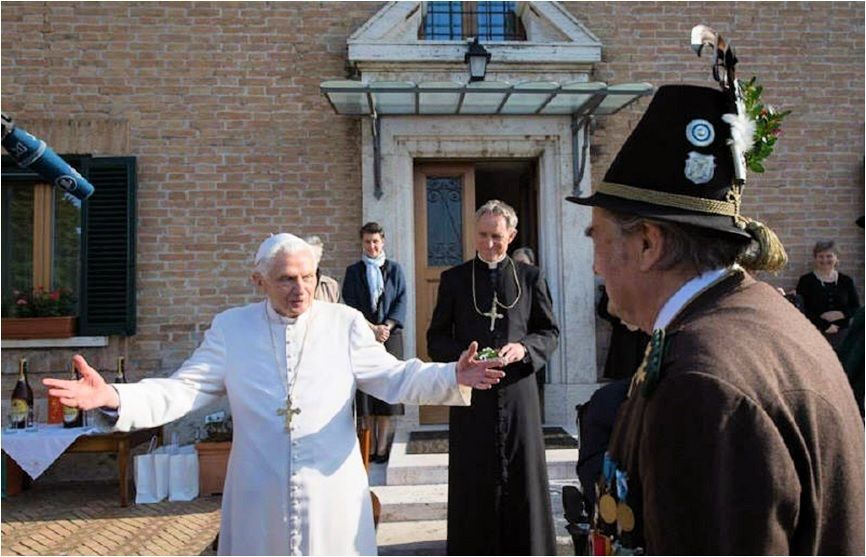
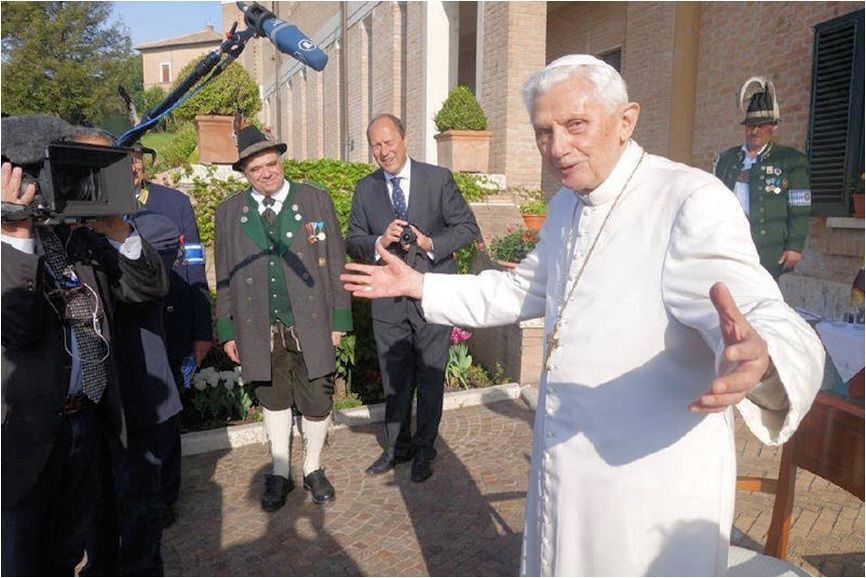
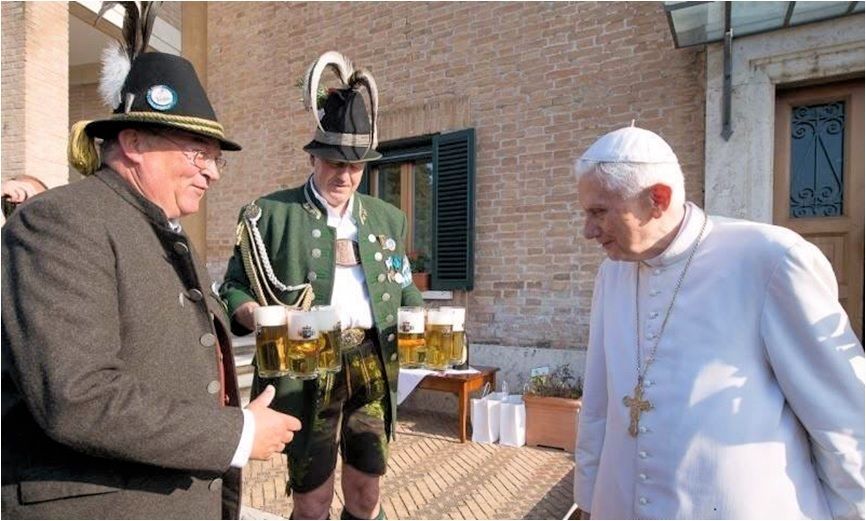
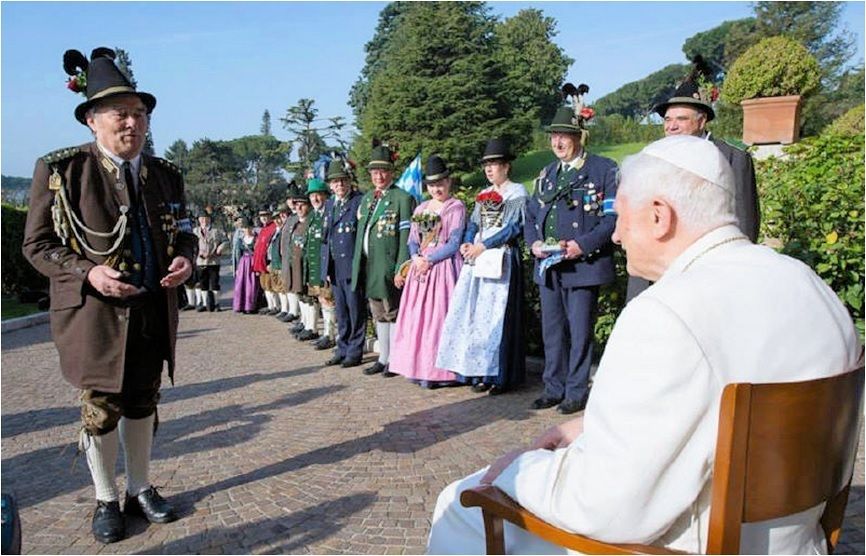
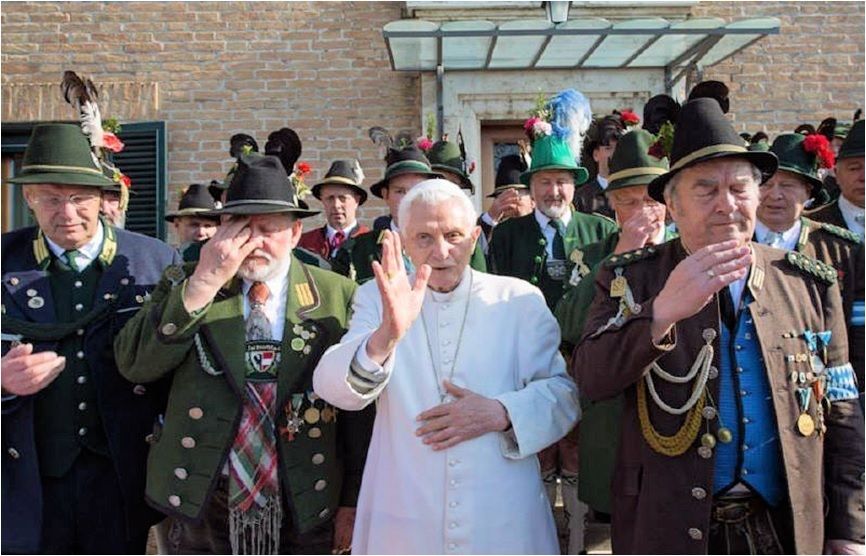 On the occasion of Benedict XVI's 88th birthday, Paolo Rodari interviewed Mons. Georg Gaenswein for La Repubblica, which is entitled rather melodramatically 'My secret Ratzinger'. It is gratifying to know that Repubblica saw fit to make a nod to the emeritus Pope on his birthday.
Mons. Gaenswein on Benedict at 88
On the occasion of Benedict XVI's 88th birthday, Paolo Rodari interviewed Mons. Georg Gaenswein for La Repubblica, which is entitled rather melodramatically 'My secret Ratzinger'. It is gratifying to know that Repubblica saw fit to make a nod to the emeritus Pope on his birthday.
Mons. Gaenswein on Benedict at 88
Interview by Paolo Rodari
Translated from

April 16, 2015
"When he renounced the Pontificate, his serenity was stunning. That spirit of serenity remains today, as he spends his days among his beloved books, arranged in the order that he has kept them for over half a century and that only he knows. He reads, he studies, he prays, he plays the piano and he sings".
He sings? "Only at Mass, of course!"
"In these Eastertide, he likes to play the melody of 'Christ has risen', a paschal hymn that was adapted from a Lutheran chorale,
Christ is erstanden, which many composers, including Bach, adapted for the organ".
Mons. Georg Gaenswein, 58, takes us into the former convent Mater Ecclesiae and into the 'private' life of Benedict XVI, the Pope emeritus of whom he remains private secretary, into the reasons for his historical renunciation, and his friendship with his successor.
These days are important for Joseph Ratzinger who turned 88 today, and on April 19, will celebrate ten years since he was elected Pope.
Let's start with his reading. What does he read these days?
He loves to read theology but also biographies. He also reads books about faith and reason. He likes Hans Urs von Balthasar, whom he reads in relation to Karl Rahner, Henri de Lubac, the theologians he worked with during Vatican II.
In the convent, he has the large library he had in his apartment at Piazza della Citta Leonina and later in the Apostolic Palace - with all his books arranged exactly as they have always been, and as only he knows. Initially, after he became Pope, when all his books had not yet been transferred to the papal apartment, I would accompany him now and then on an 'escape' to his old apartment in order to get some books that he missed.
[When Gerard Mueller came to Rome to be CDF Prefect, Benedict XVI ceded him the use of the apartment at Piazza della Citta Leonina just a few steps away from the Porta Santa Anna gate into St. Peter's Square.]
Other than his few public appearances, has he ever left the convent?
He goes out every day for his daily walk to pray the rosary in the Vatican Gardens - from the convent, he walks to the grotto of Our Lady of Lourdes, then towards the Torre San Giovanni, and back.
Walking tires him a bit now, because, as he often says, his legs are no longer as strong as before. He uses a walker which he now prefers to a cane because he feels more secure and stable.
What is his day like?
At 7:45, there's Mass in the convent chapel. Usually, I concelebrate, and when I am not there, I ask a priest friend. Attending the Mass are the Memores Domini who live in the convent and who run the household as they did in the Apostolic Palace. The Mass and other prayers of the day
[I suppose he means the Daily Office] are all said in a measured way, because Benedict XVI does not like rushing through anything. After the morning Breviary reading, there's breakfast. Then he attends to his mail which has grown lately, and to study. Three or four times a week, towards noontime, he receives visitors.
Lunch is at 1:30 PM, after which he walks a while on the roof terrace of the convent before taking his afternoon siesta. In the afternoon, around 4:15 - sometimes later, in the summer - he takes his walk in the Vatican Gardens. Then he reads and studies.
Dinner is at 7:30, after which he watches TG1
[RAI-TV's primetime newscast], and then he goes to the chapel for Complines
[last of the prayers in the Daily Office].
Is he writing a book?
He's not writing anything. He said to me, "JESUS OF NAZARETH was my last book. My scientific work is done. I no longer have the strength to write.... If I still had the strength, I would not have given up the Pontificate".
Why did he decide to remain in the Vatican?
I also asked him that. He said: "Upon reflection, I decided that Mater Ecclesiae would be the ideal retirement site because it is rather isolated, and it provides me with the freedom to live a hidden life in peace".
[In practical terms, living in the Vatican ensures his security, at no extra expense on the part of the Vatican, from crazies and other threats.]
He said that he decided to give up the Petrine ministry because on account of his age, he no longer has the necessary strength to carry on. Was this the only reason?
Yes. He said that the Petrine ministry requires vigor of the body and of the spirit -
"vigor quidam corporis et animae necessarius est". In fact, in the last months of his Pontificate, it was evident that he needed to exert himself a great deal even just to walk.
It was a difficult time in the Vatican. Did external factors also push him into retirement?
His motivation was just what we said earlier. All other hypotheses are only speculative. Obviously, everything that took place in the two years preceding February 11, 2013, consumed his strength, but that was not a reason to leave. It was not an escape. He always believed that the shepherd should never flee from anything, not even the wolves, if he met them. This is the real key to correctly understand his decision. He did not 'flee' - he simply and humbly admitted that he no longer had the strength to lead the Church of Christ as she should be led.
[Also, he did not flee in the middle of any crisis. Vatileaks had been resolved by then, IOR had begun a new lease on life with Moneyval approval, financial transparency measures were in place, and the priest abuse crisis had pretty much settled much earlier.]
Some have written that it is insupportable' to continue calling him 'Pope' even if it is 'emeritus', and that the title of Bishop would have been appropriate...
I cannot understand why the status (and title) of emeritus cannot be used for the Bishop of Rome, the Successor of Peter. Benedict XVI is the emeritus Pope, and he knows that he is so, legitimately.
He spoke to you before February 11, 2013, about his decision to step down?
Yes.
Did you try to dissuade him?
Yes. Right after he had told me, some time before February 11. But I immediately saw and understood that it was not possible to change his mind. That it was a decision he took with such clarity and serenity that all my fears and concerns vanished without him having to say anything more.
On February 28, 2013, you wept as you were leaving the Apostolic Palace with Benedict XVI. Why?
Because I was suffering inside. I knew that it was the last time I would be doing certain acts, certain gestures. And so I cried, but he himself remained most serene. He has incredible internal strength. And he is still that way.
In Castel Gandolfo afterwards, did he speak to you about the Conclave and about his successor?
After February 28, I left Castel Gandolfo every weekday morning to work [at the Prefecture of the Pontifical Household] in the Vatican. In those days, Benedict was a very tired man. He spoke very little.
When I returned from the Vatican in the afternoon, I would tell him what I did, what I saw, what I felt. He acknowledged what I said, but he made no comments and asked no questions.
On the evening of March 13, 2013, did he see on TV when Bergoglio was presented as Pope for the first time from the loggia of St. Peter's?
Yes, but at that time I was in the Vatican. In Castel Gandolfo, Benedict was with Mons. Xuereb and the Memores.
I remember that soon after he was elected, the new Pope asked me if he could call Benedict. No one was expecting any call from the Vatican at Castel Gandolfo, so no one picked up the phone when I called. They were all watching TV. Finally, we reached them, and he and the new Pope spoke on the telephone.
The following day, I asked him about the telephone call. All he said was: "It was very beautiful. I conveyed my best wishes, and I promised him my prayers".
There are also those who say that by his renunciation, Joseph Ratzinger had betrayed the Papacy and even the Church herself.
I find that ridiculous. Ratzinger, as a fine theologian, knew that a
sede vacante could result from the death of a Pope or from a renunciation - even if the second possibility had not occurred in recent times.





[Modificato da TERESA BENEDETTA 18/04/2015 01:59]